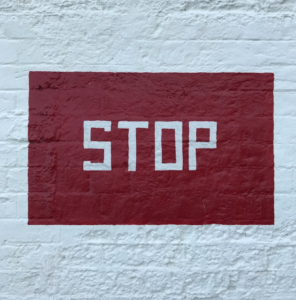How to Set Healthy Boundaries

How to Set Healthy Boundaries
Boundaries are important for every person in every relationship. They are a form of self-care. Setting boundaries is a way you can take care of yourself. It’s how you stand up for yourself and protect what is sacred to you.
As the Harvard Business Review put it, “boundaries are limits we identify for ourselves and apply through action or communication.” Boundaries are personal. They are a direct response to what we, as individuals, define as things we need to feel secure and healthy. They are tools that help to protect parts of ourselves and enhance our well-being, allowing us to be our best selves. They help us to feel safe.
There are different types of boundaries and it’s important to note that they can change over time as we grow and evolve as people.

Hard Vs. Soft Boundaries
There are two types of boundaries — hard and soft. A hard boundary is non-negotiable. It is something that you are 100% not OK with and you will not budge under any circumstances. Some hard boundary examples might be:
1.) Never drinking and driving.
2.) Someone physically harming you or a family member.
3.) Not engaging with a specific person anymore.
4.) Not accepting the way someone speaks to you.
Whatever it is, a hard boundary is something that is a “make or break.” It is saying “if you do this, I am gone.”
A soft boundary is more fluid. It is circumstantial and more flexible. Some soft boundary examples might be:
1.) Not taking work home with you.
2.) Not allowing your child to stay up past a certain time.
3.) Working out daily.
4.) Sharing cooking responsibilities with your spouse.
How to Set Boundaries
1.) Permit yourself to focus on you — A lot of times we compromise our safety or comfort to accommodate others. We might postpone setting a boundary because we are worried it may upset someone else in our lives. But, the reality is setting boundaries is a great way to grow a healthy relationship with others. Boundaries enhance self-respect and self-love and allow you to feel safer with others.
2.) Listen to your gut — All too often we brush off that uneasy feeling in the pit of our stomachs, only to regret it later. “I knew I shouldn’t have gone out tonight.” Does that sound like something you have said before? Part of creating boundaries is prioritizing your comfort and safety. What do you need? What makes you feel safe?
3.) Name your limits — Say them out loud. Sit with your emotions and ask yourself, “what do I need right now?” Say it out loud. Identify your limits so that you can better communicate them to others. “What do I need to feel supported?”
4.) Be consistent with your boundaries — If you are constantly shifting your boundaries to appease others in your life, then you are showing others that they don’t have to respect your boundaries either. Communicate what you need and stand your ground.
5.) Use “I” statements — Saying “I feel ___ when ___ because ___ “ and establishing what you need at that moment can help you to sort out your emotions and determine what you need.
6.) Be direct and clear with others — It can be difficult to take the step to set boundaries but it is so important. Think it through and figure out what you will say and how you will approach it. Then, talk calmly, directly, and with clarity.
7.) Start small — If you are an anxious person chances are you are feeling uneasy about approaching boundaries with a loved one, and that is ok. Start small. Identify one boundary that you can set and share it. For example, maybe it is “Please don’t wake me up when you get home” or “Please say goodbye to me before you leave the house.”
8.) Get support — Getting help for a counselor or therapist is a great way to identify and establish healthy boundaries. You can also turn to a friend that you feel comfortable sharing with. Maybe you can cheer each other on as you set one boundary each.

How Boundaries Can Help
Boundaries can be a great resource for anyone who struggles with anxiety or depression. An unwillingness to set boundaries can be a trauma response. If this is true for you, we strongly encourage you to seek help from a counselor or therapist who can guide you through the boundary-setting process. Boundaries are healthy and helpful for all relationships.
If you are an anxious person, establishing boundaries can help to ease some of your anxiety and help you to find more safety in your life. Maybe you need a heads-up before a family event or some time to plan or maybe you need quiet time to yourself each night to clear your head. Boundaries can also be a great tool for depression sufferers. They can help to keep you on track and mentally healthy so that you are less likely to experience depression symptoms.
Ready to begin counseling in Virginia or North Carolina?
Whole Journey works with clients throughout the state of Virginia and North Carolina via our online counseling platforms. We have office locations in Chesapeake, Richmond, and Charlotte. Our counselors are professionally trained in helping people to live healthier, happier lives. We want to see you thrive. Call our Virginia offices at 757-296-0800 or our North Carolina office at 980- 209-9805 to schedule an appointment.


